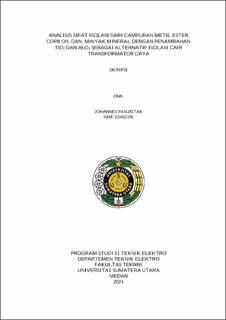| dc.description.abstract | In this study, the continuous use of non-renewable mineral oil without preparing alternative oils could pose future challenges. Vegetable oil alternatives do not yet guarantee long-term suitability due to their propensity to degrade during oxidation processes. Therefore, research was conducted by first converting vegetable oil into methyl ester before blending it with mineral oil. The study examined the insulation properties of Methyl Ester Corn Oil blended with Mineral Oil with the addition of TiO2 and Al2O3 additives.The research findings indicate that the viscosity, dielectric strength, and resistivity of Methyl Ester Corn Oil are lower compared to mineral oil, but its density is higher than that of Sheel Diala B oil. Samples with TiO2 and Al2O3 additive enhancements showed improved dielectric strength, density, and viscosity but decreased resistivity. The addition of Al2O3 additives had a greater impact on enhancing dielectric strength, resistivity, density, and viscosity compared to TiO2. In terms of resistivity parameters, higher temperatures led to decreased resistivity.The best composition percentage of Methyl Ester Corn Oil and mineral oil with TiO2 and Al2O3 additives resulted in the highest density value in S6, at 0.847 g/cm3, representing a 5% increase from S1 with a value of 0.809 g/cm3, meeting ASTM No D 1298 standards. The optimal viscosity was found in S6, at 2.82 cSt, marking a 38% decrease from S1 with a value of 4.54 cSt, meeting ASTM No D 445 standards. The best resistivity value was achieved in S8, at 0.366 GΩm, showing a 57% decrease from S1 with a value of 0.850 GΩm at 20°C and 0.172 GΩm, indicating a 64% decrease from S1 with a value of 0.850 GΩm at 90°C, meeting IEC 64422-2013 standards. The optimal dielectric strength was recorded in S8, at 28 kV/2.5 mm, showing an 11% decrease from S1 with a value of 31.6 kV/2.5 mm, meeting ASTM D 887 standards, which is 26 kV/2.5 mm | en_US |


